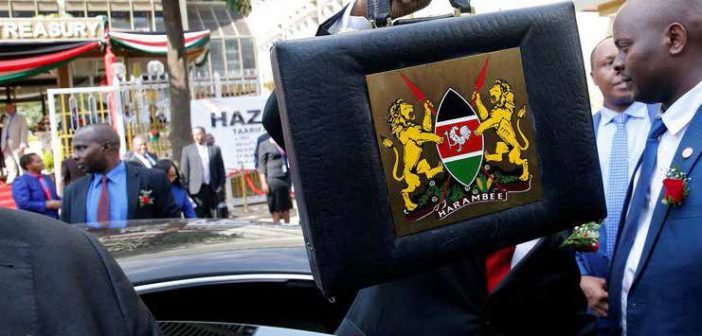By Mbatau wa Ngai
Failure to pay debts having a knock-on effect on businesses
Treasury Cabinet Secretary Ukur Yatani’s directive, last November, to State bodies to surrender cash balances in their bank accounts appears to be bearing fruit and fears the institutions might face a
cash crunch may be misplaced.
Latest Exchequer data provided by Treasury show that the public purse received as much as Sh78 billion in the first half of the current financial year. This means the government will have to borrow that much less money from the commercial banks and other financial institutions. The impressive cash haul has encouraged the Treasury CS to double the full-year non-tax revenue estimates to Sh138.86 billion from the initial Sh69.33 at the beginning of the fiscal year last July.
Treasury may, however, need to step-up surveillance of state agencies to ensure that none uses its surrender of the surplus funds to delay the payment of its debts. The argument that the surrendering of
the cash surplus, some of which was used to buy Treasury Bills and hence pushing up the cost of government borrowing, requires to be looked into also because some unscrupulous state agency chiefs
may use it to sabotage operations and then blame the CS directive.
Treasury would be letting the country down if it fails to take into account the resistance its directive has spawned on those who have been pocketing the interest earned from buying government instruments.
The increase in the government revenue from its own sources is expected to increase the amount of money available to the private sector to borrow.
The Small and Medium Enterprises (SMEs) are set to be the biggest beneficiaries because Treasury will not only use part of the money to settle some old debts owed to them but the banks and
other financial institutions will now be encouraged to lend to them.
This will be particularly true if Treasury sets in motion measures to be paying its debts regularly as this would improve the SMEs cash flow and credit record. By paying its suppliers, Treasury and the
national government, will be leading by example and the act gives it the moral authority it requires to arm-twist the county governments to pay their own suppliers and contractors.
The pressure Treasury brings to bear on ministries and county governments to pay their debts should be kept up until all of them are cleared and new ones should not be allowed to pile up.
If Treasury is required to come up with a rationale for wielding the big stick in this matter it can cite the fact that much of the looting of public money that goes on in government ministries, departments
and agencies is made possible by the blatant failure to pay debts.
After all, the various financial regulations require that these entities order for goods and services only when they have money in their books to pay for them.
The mystery of where these funds disappear to after the goods and services are delivered is the conundrum that can only be explained by a look into the corrupt practices
These questionable practices include the payment of non-existent bills presented by co-conspirators while the genuine ones are forced to wait.
A generalized payment of debts both in the public and private sectors would to lead to increased cash liquidity in the economy that has been starved of cash by widespread failure to pay debts.
Indeed, the failure by some leading firms, who are said to owe SMEs as much as Sh60 billion, to pay their suppliers and service providers has been blamed for the subsequent collapse of many SME’s
that were supplying them with goods and services.
The collapse of Nakumatt Supermarkets opened a window that showed how SMEs were arm-twisted into delivering goods to a faltering giant only to be left holding the bag.
Failure to pay debts has had a knock-on effect on many businesses and even big industries leading to loss of jobs at a time when the country is grappling with the problem of lack of jobs among the youth. To its credit, Treasury appears to realize that the money it receives from the state agencies is only a stop-gap measure and the government requires a long term solution to the problem caused by spending money that it does not have in the hope that increased taxes will fix the revenues deficit.
This realization has taken time to register and has come following years in which the Kenya Revenue Authority (KRA)has repeatedly failed to meet the ambitious targets Treasury set for it.
In its defense, KRA can plausibly argue that the targets were unrealistic given the lackluster performance of the economy whose growth has been driven more by infrastructure developments than by
higher outputs in agriculture and industry as is the norm in countries that eventually take off.
The result has been a consistent and continued drop in revenues collected from Pay As You Earn (PAYE), Corporate Taxes, Excise and Customs Duty.The dawning of this reality is what may have led Treasury to announce several austerity measures that it hopes will help it balance its books.
Analysts are not persuaded, however, that Treasury can get a good grip of the situation until the government bites the bullet and drastically reduces its expenditure on staff costs.
To its credit, Treasury appears to realize that the money it receives from the state agencies is only
a stop-gap measure and the government requires a long term solution to the problem caused by spending money that it does not have in the hope that increased taxes will fix the revenues deficit.
This realization has taken time to register and has come following years in which the Kenya Revenue A hority (KRA) has repeatedly failed to meet the ambitious targets Treasury set for it.
For surely, it cannot be right that about 2 per cent of Kenyans working in the public service gobble up about 52 per cent of what all their colleagues pay in taxes year-in, year-out leaving only a miniscule amount to be spent on development because the bulk of the balance goes to pay debts.
The tragedy for the country is that the people consuming so much of its resources are also adept at dipping their fingers into the public purse which is largely composed of borrowed funds. The fact that many of these public servants are not qualified for the jobs they are holding because they were hired under
questionable circumstances makes an already bad situation worse.
This is because these employees either idle away the time doing non-productive work or are engaged in conjuring up phantom projects which they will use as conduits to skim off still more money
from the hapless tax payer.
The list of proposed dams whose construction began and were then abandoned under mysterious circumstances are a stark reminder of how creatively destructive and brazen these public servants
have been.




